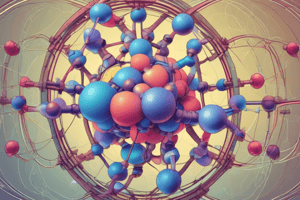Podcast
Questions and Answers
What is an example of a chemical property of a substance?
What is an example of a chemical property of a substance?
Flammability, reactivity, or pH.
What is the primary characteristic that determines the state of matter of a substance?
What is the primary characteristic that determines the state of matter of a substance?
The arrangement of particles and the energy they possess.
What is the main difference between a solid and a liquid?
What is the main difference between a solid and a liquid?
In a solid, particles have a fixed shape and volume, while in a liquid, particles have a fixed volume but take the shape of their container.
What is the method of separating a mixture based on differences in settling rates?
What is the method of separating a mixture based on differences in settling rates?
What is an example of a physical property of a substance?
What is an example of a physical property of a substance?
What is the primary characteristic that distinguishes a solid from a gas?
What is the primary characteristic that distinguishes a solid from a gas?
What is the method of separating a mixture based on differences in boiling points?
What is the method of separating a mixture based on differences in boiling points?
What is the process by which a substance changes from a solid to a liquid?
What is the process by which a substance changes from a solid to a liquid?
Flashcards are hidden until you start studying
Study Notes
States Of Matter
- Matter can exist in three main states: solid, liquid, and gas.
- These states are determined by the arrangement of particles and the energy they possess.
- Characteristics of each state:
- Solid:
- Particles are closely packed and have a fixed shape and volume.
- Particles vibrate in place but do not change position.
- Liquid:
- Particles are close together but are free to move past one another.
- Particles have a fixed volume but take the shape of their container.
- Gas:
- Particles are widely spaced and are free to move in any direction.
- Particles have neither a fixed shape nor a fixed volume.
- Solid:
Chemical Properties
- Chemical properties describe the ability of a substance to undergo a specific chemical change or reaction.
- Examples of chemical properties:
- Flammability: the ability of a substance to burn in the presence of oxygen.
- Reactivity: the ability of a substance to react with other substances to form new compounds.
- pH: the measure of the concentration of hydrogen ions in a substance.
Mixture Separation
- A mixture is a physical combination of two or more substances in which each substance maintains its chemical properties.
- Methods of separating mixtures:
- Sedimentation: separating a mixture based on differences in settling rates.
- Filtration: separating a mixture based on differences in particle size.
- Evaporation: separating a mixture based on differences in boiling points.
- Chromatography: separating a mixture based on differences in affinity for a stationary phase.
Physical Properties
- Physical properties describe the characteristics of a substance that can be observed or measured without changing its chemical composition.
- Examples of physical properties:
- Color: the appearance of a substance when light is reflected or transmitted.
- Odor: the smell of a substance.
- Texture: the feel or tactile sensation of a substance.
- Melting point: the temperature at which a substance changes from a solid to a liquid.
Matter Cyclic Changes
- Matter can undergo cyclic changes, where it is converted from one state to another and back again.
- Examples of matter cyclic changes:
- Water cycle: water evaporates from the Earth's surface, condenses into clouds, and returns to the Earth as precipitation.
- Carbon cycle: carbon is exchanged between the atmosphere, oceans, land, and living organisms through processes such as photosynthesis and respiration.
- Oxygen cycle: oxygen is exchanged between the atmosphere, oceans, and living organisms through processes such as photosynthesis and respiration.
States Of Matter
- Matter exists in three main states: solid, liquid, and gas, determined by particle arrangement and energy.
- Solids have closely packed particles with a fixed shape and volume, vibrating in place.
- Liquids have close particles that move past each other, with a fixed volume but taking the shape of their container.
- Gases have widely spaced particles moving freely in any direction, with neither a fixed shape nor volume.
Chemical Properties
- Chemical properties describe a substance's ability to undergo specific chemical changes or reactions.
- Examples of chemical properties include flammability, reactivity, and pH.
Mixture Separation
- A mixture is a physical combination of two or more substances, each maintaining its chemical properties.
- Methods of separating mixtures include sedimentation (by settling rates), filtration (by particle size), evaporation (by boiling points), and chromatography (by affinity for a stationary phase).
Physical Properties
- Physical properties describe a substance's characteristics that can be observed or measured without changing its chemical composition.
- Examples of physical properties include color, odor, texture, and melting point.
Matter Cyclic Changes
- Matter undergoes cyclic changes, converting from one state to another and back again.
- Examples of matter cyclic changes include the water cycle (evaporation, condensation, and precipitation), carbon cycle (exchange between atmosphere, oceans, land, and living organisms), and oxygen cycle (exchange between atmosphere, oceans, and living organisms).
Studying That Suits You
Use AI to generate personalized quizzes and flashcards to suit your learning preferences.




